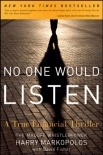No One Would Listen: A True Financial Thriller, Harry Markopolos [graded readers .TXT] 📗

- Author: Harry Markopolos
Book online «No One Would Listen: A True Financial Thriller, Harry Markopolos [graded readers .TXT] 📗». Author Harry Markopolos
If Madoff actually was purchasing these options, we would have seen the footprints of his trades. At the volume he had to be trading to produce the results he claimed, his trades should have been reflected in the market activity. But there was no sign of his presence in the market. He supposedly got in and got out, bought and sold, without leaving a trace. But then I began doing the math. I knew that there was in existence a total of $9 billion of OEX index put options on the Chicago Board Options Exchange (CBOE). Madoff claimed to be hedging his investment with short-term (meaning 30 days or less) options. You can realistically purchase only $1 billion of these, and at various times Madoff needed $3 billion to $65 billion of these options to protect his investments—far more than existed. This was a breathtaking discovery. There simply were not enough options in the entire universe for him to be doing what he claimed he was doing. If that wasn’t sufficient proof, then assuming that those options actually existed, the cost of purchasing those puts would eat up the profits he was claiming.
I also knew that he wasn’t buying them in the over-the-counter (OTC) market. That would have been prohibitively expensive, and if he had bought them there those dealers would have laid off their risk in the listed markets, and that would have shown up. It hadn’t; he wasn’t buying them there.
The explanation in Broyhill’s marketing literature failed on so many levels. Broyhill’s Manager B, Bernie, claimed to be selling call options on individual stocks, which capped his potential profit. That meant that the best-performing stocks in his basket of 35 would be called away; he’d lose the stocks that were going up, leaving him with stocks that didn’t rise significantly, stayed at about the same level, or declined. As I pointed out one day to Neil, “You know, this is the only strategy I’ve ever seen that actually penalizes you for picking great stocks.”
Rampart had run similar strategies, although we never took the single stock risks that Madoff claimed to take. We would buy the entire index, all the stocks, and what we had discovered over time was that this strategy gave us about two-thirds of the market’s return with one-third the risk. It was a successful strategy—until the market really began rising. If the market went up more than 15 percent, for example, we would miss much or most of all returns above that. In the 1990s, when the market went up as much as 30 percent (or more) in a year, we actually would lose customers, who complained, “The market was up 34 percent this year, and you were up only 22 percent.” They didn’t want to hear about protection; they wanted everything the market provided. I knew that Madoff would have run into a similar problem, especially if his insider knowledge did allow him to buy the best-performing stocks.
Until this time, which was about two months after we had encountered Madoff, the only people I had discussed him with outside Rampart were Dan DiBartolomeo, Leon Gross, a few other people whose opinions I valued, and my brother Louie, who was an over-the-counter block trader working for a firm in Miami. He knew the hedge fund world and had access to a lot of promotional material. He had agreed with me from the beginning that something was wrong with Madoff, and immediately began contributing marketing literature to our growing pile.
The fortunate thing was that at that point we didn’t know enough to be scared. It never occurred to us that we were going to be stepping on some potentially very dangerous toes. So at the beginning, at least, I didn’t hesitate to ask people I knew throughout the industry about Madoff. After examining the Broyhill materials, for example, I began questioning some of the brokers I worked with on the CBOE. A lot of these guys were longtime phone friends; I did business with them regularly and had gotten to know them on that level. I began bringing up Bernie Madoff in our conversations. It didn’t surprise me that almost all of them knew about Bernie’s brokerage arm, but knew nothing about his secretive asset management firm. I asked numerous traders if they had ever seen his volume, and they all responded negatively. But a few people who were aware he was running a hedge fund asked us if we could give them his contact information. Everyone wanted to do business with him.
But nobody admitted they were doing business with him. It was as if he had walked through Times Square naked in the middle of a summer afternoon and no one admitted seeing him. He was the ultimate mystery man.
My motive to continue this investigation was basically self-defense. My bosses had continued to pressure me to mirror Madoff so we could pick off some of that business. I knew it was impossible to compete with someone making up his own numbers, and I just wanted to get rid of the pressure. I wanted the intellectual satisfaction of proving to my bosses that they were wrong.
I certainly didn’t think of myself as a detective. I didn’t own a trench coat like Lieutenant Columbo, I had no physical handicap to overcome like Ironsides, and instead of a talking car to help me like Michael Knight had in Knight Rider, I had Neil and Frank. The only weapons we had were our knowledge of the numbers and our Rolodexes.
What I did have in addition, though,





Comments (0)